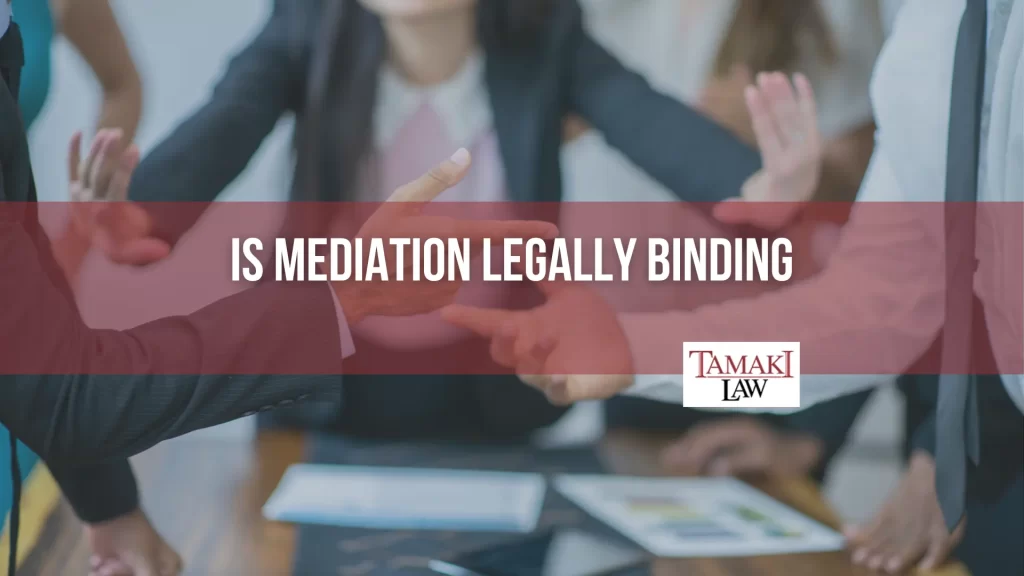
Mediation is an informal process for reaching an out-of-court agreement when disputing parties can’t agree. If you’ve been injured in an accident in Washington by someone else’s wrongdoing, mediation may be the way to reach a reasonable settlement. By having a neutral mediator present to facilitate discussions, it’s easier to find common ground. But is mediation legally binding in Washington State? Unless the negotiations result in a signed agreement, it is not. Mediation is a useful tool nonetheless, especially in a protracted legal battle.
The Washington State personal injury attorneys from Tamaki Law have used mediation to help many injured people recover fair compensation. We have seen firsthand how mediation can break the logjam of a deadlocked claim. However, working with a lawyer who understands the mediation process and how best to use it is essential.
Understanding the Mediation Process
Understanding the mediation process is essential. Here’s how it works:
- Choosing a Mediator: First, both sides agree on a neutral mediator. This person doesn’t take sides; they guide the process.
- Initial Meeting: Everyone meets in a neutral spot. The mediator explains the rules. Everything said in mediation is confidential.
- Explaining Your Case: You and the other party share your sides of the story.
- Exploring Solutions: Next, the mediator helps explore ways to reach an agreement. They will talk with each side privately in an effort to find common ground.
- Negotiation: This is where the give-and-take happens. You discuss, propose, and adjust offers.
- Reaching an Agreement (or Not): If all goes well, you agree, and a settlement agreement is drafted and signed. If not, you can try again or go to court.
The mediator doesn’t decide the case or force agreements. They help the conversation flow and keep things peaceful. The informal setup means you’re not stuck with stiff court procedures—it’s more relaxed than a courtroom.
Discussions you have in mediation aren’t binding. Just because you say something during mediation doesn’t mean you can’t change your mind before the final whistle blows. This way, everyone can speak freely without the fear of their words being used against them later. Mediation is legally binding only if you can agree with the defense.
Does Mediation Mean Settlement?
Now that you understand the mediation process, you might wonder: Does going through mediation mean you’re definitely settling your case? Not necessarily.
Mediation is a space for talking and negotiating. Think of it as a brainstorming session where both sides throw ideas back and forth. Now, these discussions are just that—talks. They’re not promises or final decisions.
Here’s the critical part: If you reach a point where everyone agrees, that’s when you’ve got something more concrete. You move from chatting to shaking hands on a deal. But it’s not just any handshake—it’s one where you all sign on the dotted line, making a written mediation agreement. That’s when the gears shift.
A mediation agreement is a contract that lists what everyone will do, how they’ll do it, and when. The mediation becomes legally binding once everyone’s signatures are on that paper.
What If Mediation Doesn’t Lead to a Settlement?
 When everyone says “no deal” at mediation, it’s not the end of the road. There are a few ways the case might proceed:
When everyone says “no deal” at mediation, it’s not the end of the road. There are a few ways the case might proceed:
- Round Two: You might decide to give mediation another shot. A little break and more thinking can help everyone return to the table with fresh eyes.
- Arbitration: This is similar to mediation but with a twist—the arbitrator has the power to make a decision that is binding on everyone.
- Litigation is when you head to court and let a judge or jury decide the outcome.
Things get formal if the mediation is unsuccessful and you’re going to court. You’ll trade the conference room for a courtroom and the mediator for a judge or jury. The process will take longer, with each side presenting evidence, questioning witnesses, and making their case. In the end, it’s the judge or jury who’ll call the shots. They listen to everything, weigh the facts, and then make the final decision, which is legally binding.
The Value of Mediation in Personal Injury Cases
Mediation is beneficial in a personal injury case because it can help you find a resolution without going to court. It’s faster than waiting for a trial, usually less expensive, and much less formal. You avoid the unpredictability of a jury decision and get to have your say, which can be satisfying. Plus, it’s private—nothing discussed in mediation is made public, which can be a relief.
Having said that, it’s crucial to understand the legal implications of mediation fully. If you and the other party sign an agreement, that document is a binding contract. If you don’t follow through, the other side can take legal action against you to enforce the agreement.
How Our Washington Personal Injury Lawyers Can Help During Mediation
When you’re heading into mediation for an injury claim, having a lawyer by your side can significantly impact the outcome. Here’s how we can help steer you through this complex process:
- Preparation: Before you even get to mediation, we can help prepare your case. We can gather evidence and facts and create a clear story of the accident and your injuries.
- Valuing Your Claim: We’ll assess the total value of your medical bills, lost wages, and even pain and suffering to maximize your potential compensation.
- Strategy: We can help you understand the mediation process and plan the best strategy to achieve the best outcome in your case.
- Negotiating: Our Washington personal injury attorneys know how to argue your position and ensure your voice is heard.
- Making Decisions: When an offer is on the table, we can help you decide whether to take it or pass.
- Drafting Agreements: If you strike a deal, we can draft the agreement, ensure it contains the exact details you agreed to, and prevent potential pitfalls.
While mediation is a powerful tool in a personal injury claim, don’t forget to hire an experienced and capable attorney. The Washington personal injury lawyers of Tamaki Law can handle the legal details and prepare you for mediation sessions. Call (800) 801-9564 now or complete our contact form for a free consultation.
Related Posts
